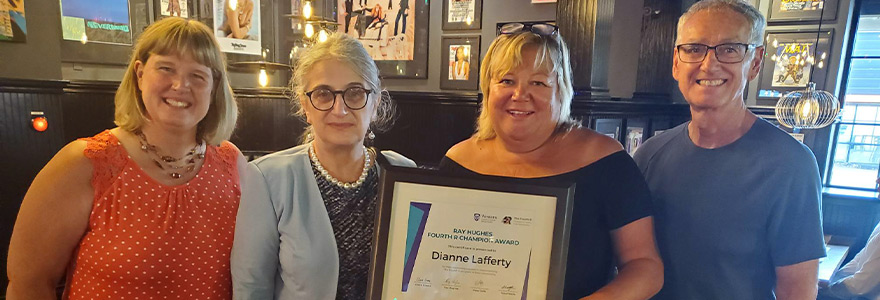
Susan Dale, left, Education Dean Donna Kostopoulos, Dianne Lafferty, and Ray Hughes. (Photo by Rosie Triebner)

Susan Dale, left, Education Dean Donna Kostopoulos, Dianne Lafferty, and Ray Hughes. (Photo by Rosie Triebner)
Educator Dianne Lafferty has received the Ray Hughes Award from the Centre for School Mental Health (CSMH) at the Faculty of Education.
Lafferty has been recognized for successfully piloting the Centre’s Fourth R program with the Yellowknife Catholic Schools. The program is now used throughout the school system.
“I'm flattered,” Lafferty said. “They're a great team to work with, they have their hearts in the right places and they're doing the right things.”
She credits the Fourth R’s program for helping students talk about healthy relationships and how to deal with conflict and situations that aren’t safe or legal.
Located in the Centre for School Mental Health, within the Faculty of Education, the Fourth R is a group of researchers and professionals dedicated to promoting healthy adolescent relationships and reducing risk behaviours. They develop and evaluate programs, resources and training materials for educators and other front-line professionals who work with youth. In particular, they work with schools to promote the neglected R – relationships – and help build it in school climates. Fourth R initiatives use best practice approaches to target multiple forms of violence, including bullying, dating violence, peer violence, and group violence.
The Fourth R – beginnings
As the Aboriginal Language and Culture Coordinator, Lafferty noticed some Indigenous students were being lost in the system. Many had barriers in their lives and weren’t able to access the supports they needed to be successful in school.
To reduce these barriers, Lafferty received a grant from the Crime Prevention Action Fund to create a resiliency program that involved mentorship and community liaison support.
This program provided on-the-land programming and taught students about protective risk taking. At the same time Lafferty’s team was developing the curriculum’s framework, they visited Western to meet the Centre for School Mental Health’s Ray Hughes and Claire Crooks. After this initial meeting, Lafferty discovered their work fit with the resiliency work they were doing in Yellowknife.
They kept in contact with the CSMH team and eventually incorporated the Fourth R into their curriculum.
Developing locally relevant content
Initially, there were concerns about implementing the Fourth R program. Lafferty said some teachers were concerned about students with lower literacy levels being able to understand the content. Also, role playing is an important of the program. This was uncomfortable for some students and teachers.
However, Lafferty and her team weren’t discouraged. They found a solution.
Working with Dene Elders, they created a Dene version of these role-playing videos. Lafferty said it was powerful seeing youth who struggled with school and with various challenges find success in the video. She added when teachers and facilitators saw the students’ videos, they could see the program work.
“These were their stories. They were re-creating scenes from their own lives,” she said.
Besides northern students appearing in these videos, the content was northern relevant. Students talked about and worked through relationship issues that were relevant to many of them, for example, peer pressure or family issues with money. Students role-played situations, such as family members asking them for money. They discussed their need to support family while still having ownership over their own finances and they found solutions, Lafferty said.
Today, the Fourth R program is a recommended program for all schools in the Northwest Territories. It’s been implemented in elementary, junior high schools as well as secondary schools.
When you take a closer look, healthy youth relationships – and having community partners champion the Fourth R curriculum – are vital to a community’s success.
“The program is relatable to the students,” Lafferty said. “I've seen it work and I believe in it.”